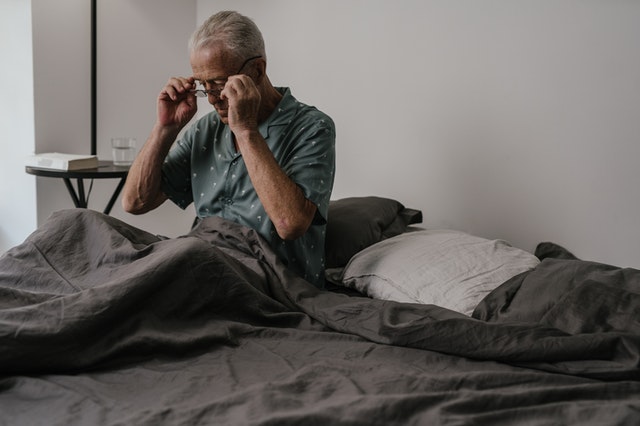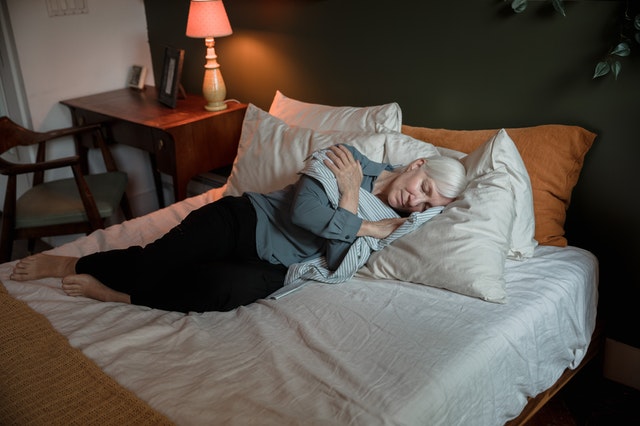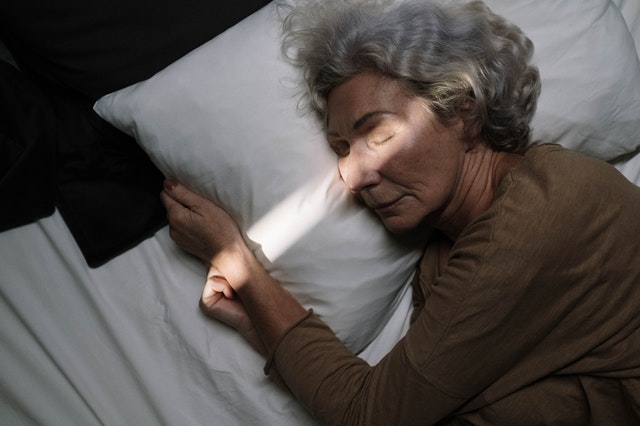Contrary to popular belief, the idea that we need less sleep as we get older is actually a myth. According to studies conducted by the National Sleep Foundation, the recommended amount of sleep for older adults remains at 7-8 hours.
Known links between our health and sleep highlight how important it is to make sure we are getting the right amount each night. Yet, according to NCBI, it is increasingly more common for older adults to experience disruptive changes in their sleep patterns.
Do Seniors Have More Trouble Sleeping Than Younger People?
It is common for seniors to report a decrease in the quality and/or quantity of sleep. Changes that we experience in our sleep pattern can make it harder to get the recommended number of hours in. Many of these changes include:
- Increased difficulty falling asleep
- Increased difficulty staying asleep
- Waking up earlier, getting tired earlier
- Waking up in the middle of the night and being unable to go back to sleep
- Increased sleepiness during the day
It is not abnormal for someone experiencing these changes to wake up 3-4 times in one night, feeling extremely awake each time and having a difficult time falling back asleep (https://medlineplus.gov. )
When we sleep, we sleep in cycles.. Each cycle consists of four separate stages of sleep and can typically last 70-120 minutes. According to the Sleep Foundation, the average person will experience four to six cycles in a night. The four stages of sleep are:
Stage 1 / N1 – This is when we first start to nod off. We are not fully relaxed yet and can be easily awakened. This stage typically lasts 1-5 minutes if the sleeper is undisturbed.
Stage 2 / N2 – At this point, we become more relaxed and harder to awaken. This stage usually lasts 10-25min the first time around and can lengthen through the night in later cycles. Half of our sleep is spent in this stage.
Stage 3 / N3 – Usually lasting 20-40 minutes, this stage is what is known as the deep sleep stage. This is when growth and restoration happens. This stage gets progressively shorter throughout the evening.
REM Sleep – Here our brain activity picks up and we see our most vivid dreams. This stage is believed to be extremely important for maintaining major cognitive functions such as learning, memory, and creativity. The length of time spent in REM sleep comes out to roughly 25% of our sleep time. We spend progressively more time in this stage as the evening goes on.
With sleep becoming more fragile, many people begin to spend less time in deep sleep.
Once we begin to experience a lack of quality sleep, some of the negative effects on our health could include:
- Difficulty concentrating
- Memory trouble
- Depression
- Decreased energy levels
- Irritability
- Weight gain
- Weakened immunity (learn more about prevent senior illness in a
- recent article)
- Increased risk for high blood pressure
- Increased risk of heart disease
- Poor balance
- Increased accidents
The good news is that if the cause of the sleep disruption can be found, it can often be treated, and have us back on our way to fully rested (https://www.ncbi.nlm.nih.gov).
Here’s why the Elderly Have Trouble Sleeping at Night

Photo by SHVETS Production at Pexels
A large percentage of older adults are estimated to have undiagnosed sleep issues. Some of the common things that can cause these issues are:
Changes In Circadian Rhythm can often be affected by lack of exposure to sunlight, as well as reduced hormone production in the brain.
Sleep Disorders such as Insomnia, Sleep Apnea, Restless Leg Syndrome, Sleep Related Breathing Disorder, Periodic Limb Movements of Sleep (PLMS), and RBD (https://www.medicinenet.com).
Medical Illness like arthritis , hyperthyroidism, diabetes, and dementia, just to name a few.
Psychiatric Illness including depression and anxiety.
Nighttime Urination, also known as Nocturia, is a problem when one must get up several times throughout the night to urinate.
Chronic Pain can make it hard to fall into deep sleep.
Lifestyle Habits such as exercise, diet, alcohol consumption, caffeine consumption. *Learn about simple exercises seniors can try to increase energy and help with sleep.
Multiple Medications can have interfering side effects that can affect your awakeness and sleepiness.
Chronic Stress
Insomnia usually goes hand in hand with other causes of sleep disruption.
These are the most common underlying causes for increased sleep disruption in older adults. By being aware, and working with a doctor, it is possible to treat and manage the effect on our daily lives.
How to Help With Sleeping Issues in Seniors

Photo by RODNAE Productions on Pexels
While a doctor can help identify the specific source of the changes in sleep, there are some lifestyle changes, or sleep hygiene tips, that can have a positive effect on your sleep right away. Here’s what you can start doing to improve your sleep:
- Keep a regular schedule. Wake up and go to sleep at the same time every day.
- Exercise regularly. Start with 20-30 minutes a day and avoid exercising before bed.
- Increase sunlight exposure.
- Avoid consuming alcohol, caffeine, and tobacco in the afternoon and evening.
- Do not nap more than 30 min once a day.
- Do not nap past early afternoon.
- Limit liquids before bed.
- Do not spend too much time in bed. If you can’t fall asleep, get up and do a soothing activity such as reading.
- Keep screens, tvs, computers, books, and other distractions out of the bedroom.
- Take a warm bath before bed.
- Meditate before bed.
- Get new pillows if it has been awhile. Make your bed as comfortable as possible.
By implementing these changes to your lifestyle and working on a care plan with your healthcare team, you can help improve the quantity and quality of your sleep.
Sandyside Senior Living
This information was provided by Sandyside Senior Living in White Lake, Michigan. Sandyside specializes in advanced care for seniors with dementia, Parkinson’s, and all age-related illness.
Interested in learning more about Sandyside Senior Living? Contact Sandyside online, or call at (248) 698-3700.
To get in touch with Sandyside Senior Living please complete the form below:
VISIT SANDYSIDE SENIOR LIVING TODAY
PHONE: (248) 698-3700


